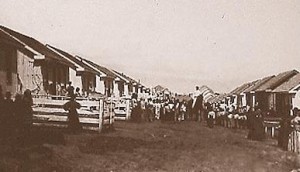In Nicholasville, Kentucky in 1846, black Baptists were granted permission to worship under the supervision of white Baptists. Those worship services have been conducted in the Union Church building since 1846.
Today, however, a lot on York Street is deeded to Peter Johnson, a trustee of the black church, on behalf of the congregation. Eventually, the site becomes home to the African Baptist Church (later renamed the First Baptist Church), of which Peter Johnson serves as the first pastor.
On this same day on the outskirts of the town of Nicholasville, some 3,000 former slaves, or “contrabands,” pressed into the service of the Union Army, are tasked with building a supply depot for Union invasions into Tennessee. The name of the facility is Camp Nelson.
Camp Nelson for the remainder of the war becomes a “cradle of freedom” for many former slaves. The largest recruiting center for African American troops in Kentucky, during the war Camp Nelson provides some 10,000 African Americans with freedom in exchange for service in the Union army. In some instances, former slaves bring their families along with them. Northern missionaries help care for the freedpersons working and living at Camp Nelson.
In the gifting of land for a Baptist church and in military service for the United States Army in a small town in rural central Kentucky, today thus marks another step in the march toward freedom for African slaves.
Sources: “Our History,” First Baptist Church of Nicholasville, Kentucky” (link); Camp Nelson Civil War Heritage Park (link); Camp Nelson National Cemetery, National Park Service (link); Richard D. Sears, Camp Nelson: A Civil War History, Lexington: University Press of Kentucky, 2002 (link); image, Camp Nelson Restoration and Preservation Foundation (link)



